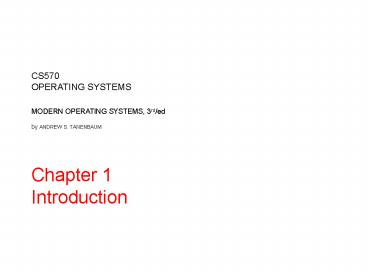CS570 - PowerPoint PPT Presentation
1 / 43
Title: CS570
1
CS570 OPERATING SYSTEMS MODERN OPERATING
SYSTEMS, 3rd/edby ANDREW S. TANENBAUMChapter
1Introduction
2
What Is An Operating System (1)
- A modern computer consists of
- One or more processors
- Main memory
- Disks
- Printers
- Various input/output devices
- Managing all these components requires a layer of
software the operating system
3
What Is An Operating System (2)
Figure 1-1. Where the operating system fits in.
4
The Operating System as an Extended Machine
Figure 1-2. Operating systems turn ugly hardware
into beautiful abstractions.
5
The Operating System as a Resource Manager
- Allow multiple programs to run at the same time
- Manage and protect memory, I/O devices, and other
resources - Includes multiplexing (sharing) resources in two
different ways - In time
- In space
6
History of Operating Systems
- Generations
- (194555) Vacuum Tubes
- (195565) Transistors and Batch Systems
- (19651980) ICs and Multiprogramming
- (1980Present) Personal Computers
7
Transistors and Batch Systems (1)
Figure 1-3. An early batch system. (a)
Programmers bring cards to 1401. (b)1401 reads
batch of jobs onto tape.
8
Transistors and Batch Systems (2)
Figure 1-3. (c) Operator carries input tape to
7094. (d) 7094 does computing. (e) Operator
carries output tape to 1401. (f) 1401 prints
output.
9
Transistors and Batch Systems (4)
Figure 1-4. Structure of a typical FMS job.
10
ICs and Multiprogramming
Figure 1-5. A multiprogramming system with three
jobs in memory.
11
Computer Hardware Review
Figure 1-6. Some of the components of a simple
personal computer.
12
CPU Pipelining
Figure 1-7. (a) A three-stage pipeline. (b) A
superscalar CPU.
13
Multithreaded and Multicore Chips
Figure 1-8. (a) A quad-core chip with a shared L2
cache. (b) A quad-core chip with separate L2
caches.
14
Memory (1)
Figure 1-9. A typical memory hierarchy. The
numbers are very rough approximations.
15
Memory (2)
- Questions when dealing with cache
- When to put a new item into the cache.
- Which cache line to put the new item in.
- Which item to remove from the cache when a slot
is needed. - Where to put a newly evicted item in the larger
memory.
16
Disks
Figure 1-10. Structure of a disk drive.
17
I/O Devices
Figure 1-11. (a) The steps in starting an I/O
device and getting an interrupt.
18
Buses
Figure 1-12. The structure of a large Pentium
system
19
The Operating System Zoo
- Mainframe operating systems
- Server operating systems
- Multiprocessor operating systems
- Personal computer operating systems
- Handheld operating systems
- Embedded operating systems
- Sensor node operating systems
- Real-time operating systems
- Smart card operating systems
20
Operating System Concepts
- Processes
- Address spaces
- Files
- Input/Output
- Protection
- The shell
- Ontogeny recapitulates phylogeny
- Large memories
- Protection hardware
- Disks
- Virtual memory
21
Processes
Figure 1-13. A process tree. Process A
created two child processes, B and C. Process B
created three child processes, D, E, and F.
22
Files (1)
Figure 1-14. A file system for a university
department.
23
Files (2)
Figure 1-15. (a) Before mounting, the files on
the CD-ROM are not accessible. (b) After
mounting, they are part of the file hierarchy.
24
Files (3)
Figure 1-16. Two processes connected by a pipe.
25
System Calls
Figure 1-17. The 11 steps in making the system
call read(fd, buffer, nbytes).
26
System Calls for Process Management
Figure 1-18. Some of the major POSIX system
calls.
27
System Calls for File Management (1)
Figure 1-18. Some of the major POSIX system
calls.
28
System Calls for File Management (2)
Figure 1-18. Some of the major POSIX system
calls.
29
Miscellaneous System Calls
Figure 1-18. Some of the major POSIX system
calls.
30
A Simple Shell
Figure 1-19. A stripped-down shell.
31
Memory Layout
Figure 1-20. Processes have three segments
text, data, and stack.
32
Linking
Figure 1-21. (a) Two directories before linking
/usr/jim/memo to asts directory. (b) The same
directories after linking.
33
Mounting
Figure 1-22. (a) File system before the mount.
(b) File system after the mount.
34
Windows Win32 API
Figure 1-23. The Win32 API calls that roughly
correspond to the UNIX calls of Fig. 1-18.
35
Operating Systems Structure
- Monolithic systems basic structure
- A main program that invokes the requested service
procedure. - A set of service procedures that carry out the
system calls. - A set of utility procedures that help the service
procedures.
36
Monolithic Systems
Figure 1-24. A simple structuring model for a
monolithic system.
37
Layered Systems
Figure 1-25. Structure of the THE operating
system.
38
Microkernels
Figure 1-26. Structure of the MINIX 3 system.
39
Client-Server Model
Figure 1-27. The client-server model over a
network.
40
Virtual Machines (1)
Figure 1-28. The structure of VM/370 with CMS.
41
Virtual Machines (2)
Figure 1-29. (a) A type 1 hypervisor. (b) A type
2 hypervisor.
42
The World According to C
- The C language
- Header files
- Large programming projects
- The model of run time
43
The Model of Run Time
Figure 1-30. The process of compiling C and
header files to make an executable.


















